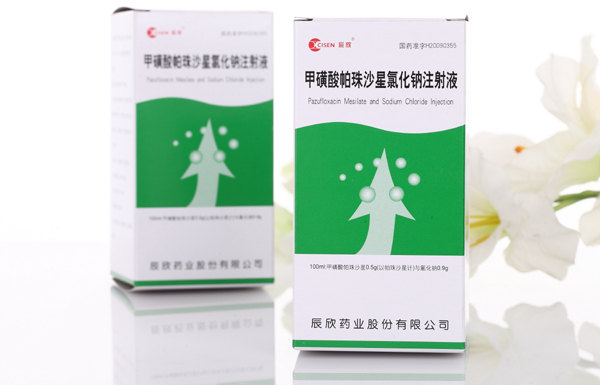Description: Pazufloxacin Mesylate and Sodium Chloride Injection is a fluoroquinolone antimicrobial agent having a wide range of activities and potent actions against both gram-positive and gram-negative bacteria. Pazufloxacin is a fused tricyclic quinolone derivative with a 1-aminocyclopropyl substituent at C10 position. The presence of aminoacyl group at C-10 is a unique feature of the molecule imparting potent broad spectrum activity against gram-positive and gram-negative bacteria including variety of resistant strains and anaerobic bacteria.
Pharmacological effects: Pazufloxacin Mesylate and Sodium Chloride Injection has shown multimodal mechanism of action and inhibits both DNA gyrase and topoisomerase IV enzyme, leading to increased antibacterial spectrum. Moreover, pazufloxacin has been shown to have DNA antagonistic actions also.The multimodal mechanism of action is linked to the low potential for the development of resistance in pazufloxacin. Moreover, it has been shown that pazufloxacin is not affected by efflux mechanism of resistanc. Pazufloxacin mesilate is a novel injectable quinolone antibiotic. Laboratory studies indicated that PZFX reached high plasma levels quickly after intravenous administration, and it exhibited weak convulsion inducing activity, low local irritant effect, and less hypotensive activity, all of which are generally recognized as side effects associated with other injectable quinolones. PZFX has potent antibacterial and bactericidal activities against cephalosporin-, carbapenem-, and aminoglycoside-resistant strains. These favorable antibacterial and bactericidal activities gave PZFX superior therapeutic effects, compared to injectable cephalosporin antibiotics, on experimental animal infection models caused by those resistant strains. Clinical studies also revealed PZFX was as safe and effective as the injectable cephalosporin, ceftazidime, against various moderate to severe infections. Furthermore, PZFX showed good clinical effects on the infections resistant to chemotherapy by the other antimicrobial agents. These results indicate that PZFX is a viable choice for various bacterial infections. In this review, results of laboratory and clinical studies are summarized and the clinical role of PZFX among the injectable antimicrobials is discussed (Minami Shinzaburo).
Pharmacokinetics: 12 healthy volunteers were randomly assigned to one of three dosing groups using a Latin method; the volunteers were intravenously infused with pazufloxacin mesilate 250 mg, 500 mg or 750 mg, respectively. The blood and urinary samples from the volunteers were collected at certain timepoints to determine the drug concentrations by HPLC. The following pharmacokinetic parameters of three dosing groups were obtained by DAS software: C_(max) (7.23±1.56), (13.50±2.15) and (21.97±3.62) mg·L~(-1); AUC_(0~∞) (17.72±3.91), (35.92±5.71) and (61.23±18.08) mg·L~(-1)·h; t_(1/2)β(2.03±0.12), (2.06±0.30), (1.99±0.26)h; CL(15.63±2.99), (14.76±2.63), (13.22±3.03) L·h~(-1)·kg~(-1); V_1(16.48±5.65), (17.29±9.01), (14.87±8.04)L; the P values of the C_(max) and AUC_(0~∞) showed statistical difference(P<0.05) and no significant differ- ence were found for the rest of PK parameters (P>0.05). The 12-hour cumulative urinary excretion rates were (93.85±1.71)%, (93.14±1.82)% and (93.24±1.74)%, respectively. Injection of 500 mg pazufloxacin mesilate sodium chloride twice per day has optimal anti-bacterial outcomes. (WANG Jin)
Indications: Pazufloxacin mesylate and Sodium Chloride Injection is indicated for the
following infections caused by susceptible microorganisms: RTIs like pneumonia and lung abscess; UTIs like cystitis, pyelonephritis and prostatitis; Abdominal infections like peritonitis, cholecystitis, liver abscess and other intra-abdominal abscesses; Genital infections like endometritis; Secondary infections after injuries, burns and post-operative. The current available data does not support its use against atypical infections, though there are a few papers on its use in
Legionella infection. Pazufloxacin mesylate and Sodium Chloride Injection has good antibacterial activity against variety of clinical isolates. The MICs at which 90% of the isolates were inhibited (MIC90s) of pazufloxacin were 0.2 to 0.39 µg/ml for Staphylococcus aureus and Staphylococcus epidermidis, including methicillin-resistant strains.5 Pazufloxacin has similar or 2-fold greater activity than other quinolones, against the following Enterobacteriaceae (MIC90 ≤ 0.25 μg/ml): Escherichia coli, Klebsiella, Enterobacter, Hafnia, Citrobacter, Proteus, Providencia, Serratia, Shigella, Salmonella, Aeromonas and Yersinia. Against P. aeruginosa, pazufloxacin shows more potent activity than tosufloxacin, norfloxacin and ofloxacin. Against clinical isolates of methicillin-resistant Staphylococcus aureus and P. aeruginosa, pazufloxacin has an MIC90 of 0.39 μg/ml and an MIC90 of 0.78 μg/ml respectively. MIC90 for clinical isolates of H. influenzae is ≤ 0.013 μg/l.5. The antibacterial activities of PZFX are superior to those of ceftazidime (CAZ), ceftriaxone, Imipenem/cilastatin (IPM/CS), meropenem against6, Methicillin resistant S. aureus (MRSA), Ampicillin-resistant Haemophilus influenzae, ESBL possessing Klebsiella pneumoniae Imipenem/cilastatin (IPM/CS)-resistant Pseudomonas aeruginosa.
Precautions: Pazufloxacin mesylate and Sodium Chloride Injection should be administered with caution to any patient who has a previous history of hypersensitivity for quinolone antimicrobial drugs, patients with severe renal damage, patients who have convulsive disorders such as epilepsy, and elderly patients. Pazufloxacin is contraindicated in the patients who have a history of hypersensitivity to any component of the formulation, pregnant women, infants and children.
Adverse reaction: The most commonly encountered adverse events reported with Pazufloxacin mesylate and Sodium Chloride Injection include diarrhoea, rashes, nausea and vomiting. There are case reports of convulsions with the use of the molecule.

